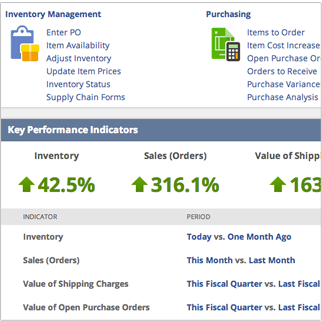Product Features
For Wholesale Distribution
Home / Source
Menu
Source
Maximize Profit with Sourcing Controls
Do you have a centralized, optimized purchasing process?
Can you easily use sales forecasts to influence your supply orders?
NetSuite ensures transparency and control throughout the purchasing process, builds favorable supplier relationships, and provides deep insights into performance and forecasting.
Suppliers and Procurement
- Analyze supplier performance.
- Collaborate with suppliers in real time through the Supplier Portal.
- Create a centralized purchasing process.
- Build a real-time approval workflow based on PO amount.
- Ensure purchasing compliance.
- Handle supplier payments efficiently.
Sales Forecasts and Operational Planning
- Generate supply orders based on your sales forecasts.
- Reforecast and regenerate supply orders when forecasts change.
- Decrease lead times and increase your fill rates.
- Minimize stockouts and obsolete inventory.

Business Impact
Inventory Cost Management
Control costs to maximize profit potential.
Lead Time
Forecast accurately to ensure on hand supply.
Cash Flow Management
Support cash flow with purchasing controls.




























